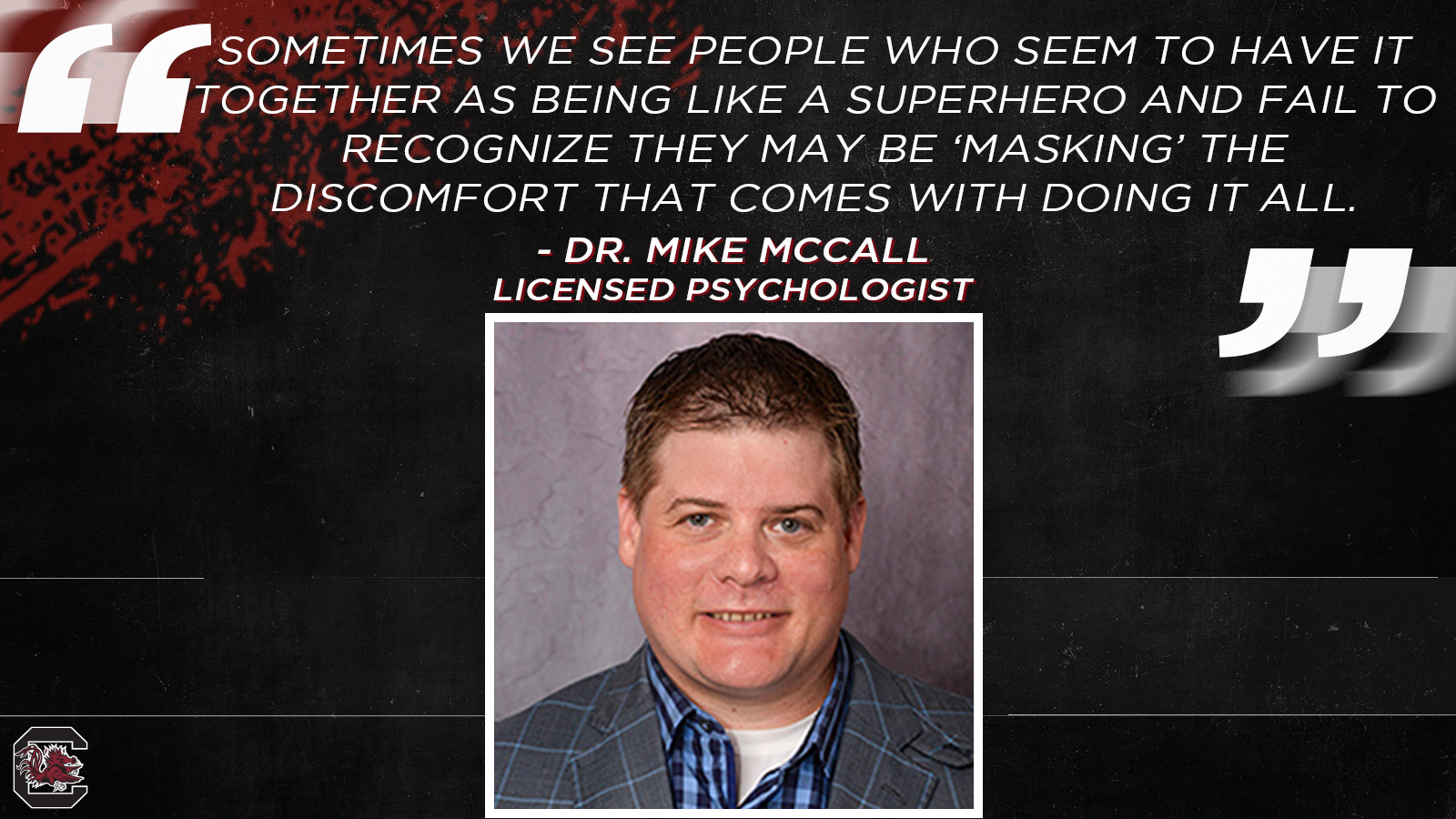
Mental Health Awareness Month - Part 3: How to Make a Difference
South Carolina Athletics provides the Gamecocks with a variety of mental health options.
South Carolina Athletics provides its student-athletes access to a wide variety of mental health providers, with expertise ranging from mental performance to mental health services, covering their psychological, psychiatric, and emotional needs. The Gamecocks have six mental health professionals on staff with psychiatrist and Director of Mental Health Dr. Timothy Malone, Director of Operations for Mental Performance Sarah Noll, licensed psychologists Dr. Rhea Merck and Dr. Mike McCall, sports psychologist Dr. Jan Veinot, and Director of Sport Leadership and Mental Performance, Dr. Raylene Ross. In part three of our series for Mental Health Awareness Month, our mental health professional discuss why some student-athletes may be suffering from depression and how their efforts are helping.
To an outsider, a student-athlete seems to have it all, so it’s hard to understand how they can spiral into such a state. In general, males die by suicide at a greater rate than females, but the recent number of female student-athletes taking their own lives is just cause to take notice and pay attention to what’s going on in their day to day lives.

Samantha Chang
“I know a lot of girls who feel like they have to be perfect, and they have to get good grades and be good leaders in the community,” said rising senior women’s soccer student-athlete Samantha Chang. “We have all these things that we’re juggling. So, we need to be OK with talking to somebody and be proud about that. I’m so grateful for our coaches because they do prioritize relationships with us. That’s important to know that the coach sees me as a person and not just as a player on this team who can score a goal. The friendships between teammates are important too. We just need to put it more into our schedule now and normalize it, so they know it’s OK to not be OK. It’s OK to be going through stuff because we all go through stuff.”
“With the growth of women’s sports, women tend to have more negative perfectionism,” Dr. Veinot said. “In that mindset, there’s no room for failure. They believe that women can do anything, and they try to do everything. They do well in school and they’re on top in athletics and they’re doing all these community service hours. The only way to go when you’re perfect is down. They don’t feel like they’re allowed to have any kind of failure. They don’t feel that they’re able to be vulnerable.”
“A lot of student-athletes are really good at putting on the happy face when they’re in front of teammates, coaches, friends and family,” Dr. McCall said. “It’s like they never want to show a crack in the armor. To overcome that barrier and to be able to reach out to someone and talk about it when things are not going well means admitting to themselves that they are not perfect.
“We’ve gone from 500 points of contact with student-athletes to almost 1,000, just in the fall semester.”
– Sarah Noll
“Having a conversation with the people you are friends with is part of it. Don’t assume people are OK. Ask. Some (of the high-profile cases referenced in part 1) seemed to have no warning, but maybe had people not assumed they were OK and created a conversation space, they could have opened up. Sometimes we see people who seem to have it together as being like a superhero and fail to recognize they may be ‘masking’ the discomfort that comes with doing it all. Have this conversation and don’t assume someone is OK or not OK. Make the human connection so that people feel they can be honest about their feelings. A lot of times sharing our own vulnerabilities is a way for others to lower their guard too.”
“If somebody has that level of success and they feel like they’re not living up to it or not meeting their standard of perfection, it’s a lot of pressure to have to try to maintain that level of success, whether it’s in the classroom or on the field,” Noll said. “There can be a disconnect because as a student-athlete, you can seem to have it all to those on the outside, but what’s really going on, on the inside, is something different and you can feel sad or isolated. You may not be comfortable in telling someone things aren’t so great, even though to the outside world, they should be.”

Sarah Noll & Dr. Rhea Merck
Noll noted that they are indeed seeing more student-athletes now than they have in years past.
“I’ve been here for four years, and I have stats for all the years, except the fall of COVID (2020), and we’ve gone from 500 points of contact with student-athletes to almost 1,000, just in the fall semester,” Noll said.
On the one hand, it’s scary to think that there may be such a large increase in the need of mental health attention, but on the positive side, more people are talking about it as well and getting help.
“I tend to see it more as a positive,” Noll said. “It’s a good thing that more people are reaching out. Our reach has widened as well because we have so many more providers.”
More in this series:
Mental Health Awareness Month: Standing Up for Opening Up
Mental Health Awareness Month – Part 1: Providing Hope to Cope
Mental Health Awareness Month – Part 2: Warning Signs












